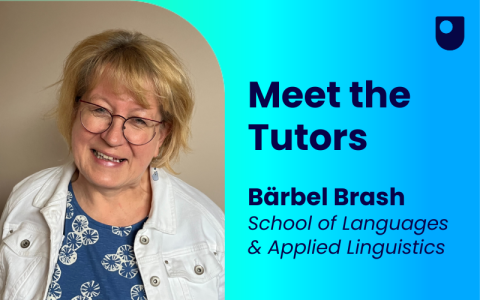Meet the Tutors: Bärbel Brash

From 1999 to 2021, Bärbel Brash taught German to hundreds of OU students. Recently taking on a new position at The Open University in Scotland, she tells us about her time as an Associate Lecturer, or Tutor, in the WELS School of Languages and Applied Linguistics (LAL), as well as her involvement in a course that challenges perceptions around learning languages later in life.
“I came to Scotland from Germany as an Erasmus student. After I graduated, I worked in adult education and did some work for Moray Council, mainly developing adult-education provision in the area. Alongside this, I was teaching German. I’d been looking for flexible and interesting teaching work when, I met an OU languages tutor who encouraged me to apply. I started out on a Level 2 German module in 1999, working maybe six or so hours a week – ideal, as by that point I had a young family.
“Students are part of my love of the OU”
“I quickly found I enjoyed working with students and learning from them, so gradually took on more work with the OU modules – as well as external engagements, projects and research. This was of benefit to my students, as I could follow them through their studies from beginner’s level upwards. Working with people over such a period of time really allowed me to get to know them, helping me understand their personal challenges and their motivations for learning, while being able to share their achievements along the way. I felt really inspired by them, so the more work I took on, the more rewarding it became.
“Languages are for more than just communication”
“One of the additional projects I am working on is the Learning Languages with Senior Learners (LLWSL) course. Through a partnership with the OU in Scotland, Dr Sylvia Warnecke and I began a collaboration with Lingo Flamingo on LLWSL, with a view to training social-care workers in different settings to provide language learning for senior learners. Research has shown that learning a language can delay the onset of neurodegenerative diseases and age-related dementias by up to five years. So, the focus is on learning languages for wellbeing, rather than the intention of visiting a country. There’s a perception that older people struggle with learning languages because they face more age-related challenges such as hearing impairments or memory issues but in some respects, they’re actually better at it. They have greater world knowledge, for example, and often better learning strategies, plus different motivations. They're also often very good at skills-based activities.
“Learning can benefit teachers too”
“Our mission for the LLWSL course is social justice – creating inclusive communities, responding positively to the different needs and circumstances senior learners have so they can access and participate in learning opportunities, allowing senior learners to achieve their potential. Another aspect is enabling care workers to develop employability skills. A number of the care workers don’t have English as a first language, so it’s been empowering for them to share their bilingual abilities. We had one Spanish care worker, for example, who taught her native language and she found that amazing. Employers of care workers have commended the programme too, reporting that staff have been enabled to take on new leadership roles, and even revolutionise aspects of care. We now want to provide digital badges for the course, and possibly use it as a model for further courses we could develop in the area.
“A WELS Tutor Award made the perfect end to my years as an Associate Lecturer”
“Winning a WELS Tutor Award was totally emotional – I was completely blown away by it. Just before I won, I had decided to give up my role as a tutor. It was a pity the award came then because I might have changed my mind and stayed as an Associate Lecturer (AL) for a little longer if I’d known! Yet it was a lovely way to round off my time as a tutor. It’s also important to point out that my work as an Associate Lecturer was never individual work. I feel the award was not just for me, but for the whole team.
“Teaching others is an honour”
“My new role as a Staff Tutor at the OU sees me leading a team of ALs, with the most important part being that we work together as a team. We want to make the journey for our students positive and inclusive. Languages open doors into new worlds and tutors are so privileged to be able to accompany people as they go off and explore. Fostering a love of languages encourages a desire to learn about different cultures, and developing a better intercultural understanding helps find ways to work together and build bridges. My students have taught me so much over the years, and it's been a fantastic journey in that respect. Absolutely unmissable.”
More information
Open a door to a new world by studying languages at the OU.
Find out more about becoming an Associate Lecturer with the OU.
See all current Associate Lecturer vacancies within the Faculty of WELS.
Are you already an OU student?
Request your prospectus
Explore our qualifications and courses by requesting one of our prospectuses today.
Request prospectus